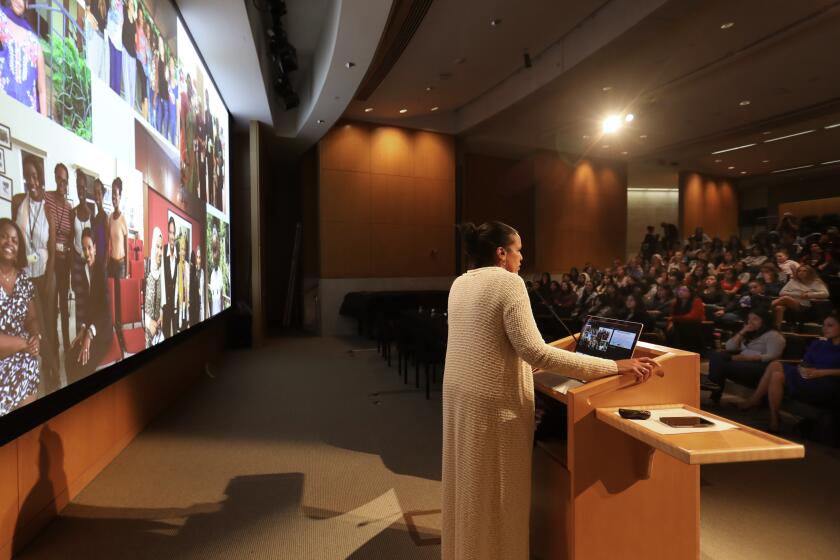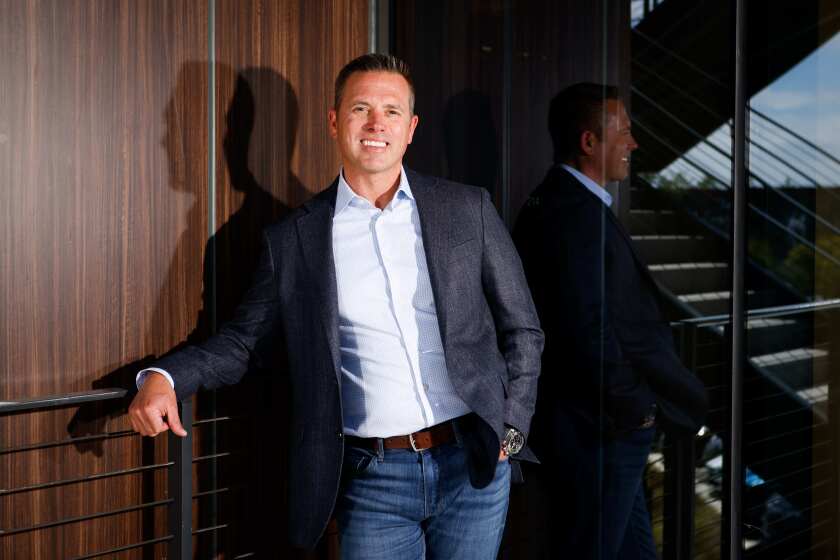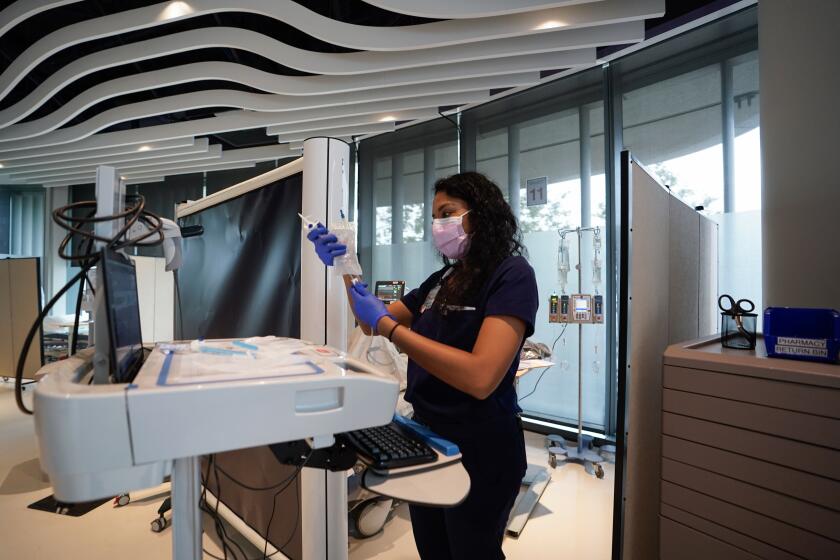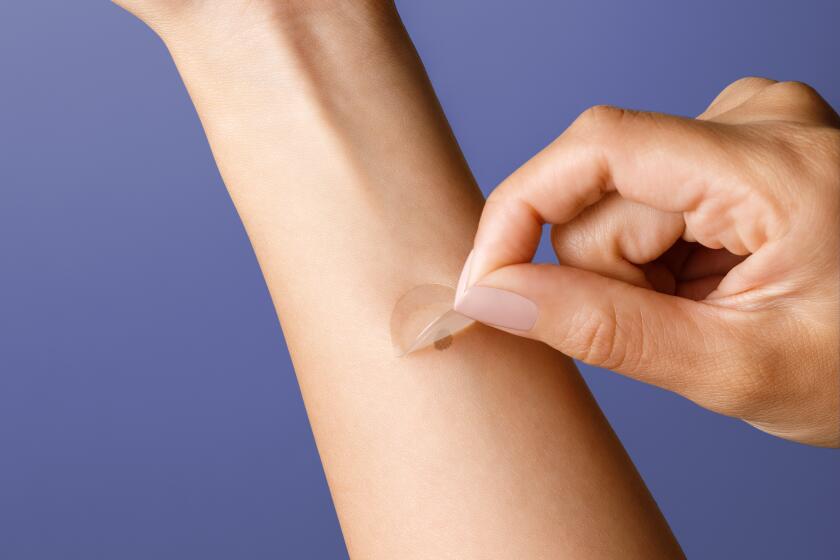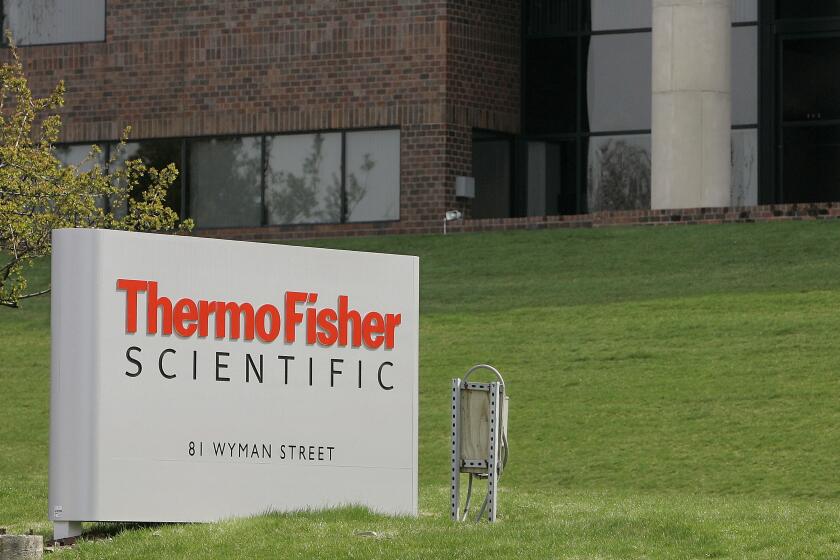Email reveals former Salk president’s efforts to discourage gender discrimination suit
The former president of the Salk Institute discouraged one of her professors from suing for gender discrimination, saying in a private email that legal action could damage the La Jolla science center’s reputation — and suggested it might harm the researcher’s career.
Elizabeth Blackburn, a Nobel laureate, sent the email to biochemist Beverly Emerson on June 30, 2017.
“Families have disagreements. But they don’t litigate their disagreements,” Blackburn told Emerson, adding that a lawsuit would be “ill-advised” and might not be the most prudent tactic for her career.
In a dispute that’s been unfolding in court documents, Emerson, 66, a noted cancer researcher, decided to join colleagues Katherine Jones and Vicki Lundblad in suing the Salk for alleged gender discrimination.
All three women claimed that the Salk had systemically discriminated against them on salary, benefits, promotions and access to private donations.
The Salk announced out-of-court settlements with Jones, 63, and Lundblad, 65, on Aug. 7. Neither researcher is talking. Nor is Emerson, who is proceeding with her lawsuit.
But their concerns are outlined in court documents — especially those of Emerson, who went from believing that the institute might shed its “misogynist culture” to thinking that very little would change.
The Salk denies that it discriminated against the women. And it is asking a San Diego Superior Court judge to remove Blackburn’s email to Emerson from the record, saying that it is a privileged communication. That request is scheduled to be considered on Friday.
The institute says the email is privileged because it is part of mediation between Emerson and Salk.
Emerson’s attorney, Alreen Haeggquist, disputes that the email is privileged and says the email helps establish that Emerson was retaliated against for filing the lawsuit.
“It is disappointing that (Emerson’s) counsel has chosen to disclose what we maintain is a privileged communication, over our objections and before the matter could be decided by the Court, particularly because Dr. Blackburn’s message was a sincere effort to reach out to Dr. Emerson and avoid litigation,” said Steve Strauss, an attorney representing the institute, in a statement emailed to the Union-Tribune. “That olive branch is now being used out of context to create an unfair and inaccurate characterization of Salk.”
Blackburn, 69, could not be reached for comment. She left the institute earlier this year after announcing her retirement in December.
Optimism
In May 2016, Emerson, Jones and Lundblad met with Blackburn to discuss the Salk’s workplace culture and advancement opportunities. Blackburn had become president in January.
The meeting seemed to go well.
“I don’t want to go too overboard (ok, maybe I will just a bit), but our meeting with Liz (Blackburn) was a little tiny bit historic,” Lundblad wrote in an email to Emerson. “First time in decades (or ever) that three senior women faculty sat in the Salk President’s office and were lauded by the Salk President for their scientific achievements ...
“Yes, you had support from me and Kathy, but all the heavy lifting was done by you — and if you hadn’t run for faculty chair, I don’t think the three of us would’ve been there, listening to Liz acknowledge that “yes, there is a real problem, and it’s been a problem for years.”
Emerson replied, “I think with Liz at the helm, the misogynist culture will definitely change and the Institute will evolve. This has to be set in stone or things can revert back when Liz eventually steps down (hopefully after many years.)
“This is poignant, wonderful, and sad all at the same time.”
The question of gender balance at the institute also was called into question in early 2016 by Seattle cancer researcher Robert Eisenman, who served on the Salk’s External Advisory Board.
“I’ve certainly been aware of the lack of gender balance but to my knowledge it never came up as an issue for discussion at any of our EAB meetings,” Eisenman told Emerson in a February email. “I wish it had.”
Claim of retaliation
Emerson left the institute at the end of December after her contract was not renewed. She technically remains at the Salk as an emerita faculty member.
In her lawsuit, Emerson maintains that the failure to renew her contract was illegal retaliation and points to Blackburn’s June 30, 2017 email as evidence.
“You have a reputation to protect,” Blackburn wrote. “The Institute has a reputation that it will vigorously defend. While you certainly have a right to litigate, I ask you to consider if this is the least injurious path toward achieving your goals. What feels good right now, based, perhaps, on complex emotions, may not prove -- on a career-long road -- the most prudent tactic.”
Emerson responded to Blackburn’s email on July 3, agreeing to talk with Blackburn and reiterating her grievances.
“As you know, I have tried to resolve the issues you are referring to in many ways, even as Faculty chair and Board member, but in my mind nothing changed for the senior female faculty,” Emerson replied.
“Even lately, simple things like getting broken departmental equipment replaced ... and even trying to get a donation by giving a lab tour and showing a PowerPoint to the Brown Foundation, have been unsuccessful.”
“My request to hire a part-time student lab helper, previously approved, was not re-approved and my student, whom we had trained as a volunteer for several months, took a job elsewhere. I only have two postdocs in my lab so their time to train the student is valuable,” Emerson said.
“Finally, I haven’t heard any updates about the status of fundraising for my research proposal on “Cancer Ecosystems” in several months even though I worked to prepare a 5 year budget and write a lay summary as requested.”
Strauss, the Salk attorney, said Emerson’s tenure expired at the end of 2017, and that the Salk followed proper procedure in not renewing her contract.
“To qualify for a post-tenure appointment, Salk professors must meet the external funding requirements set out in the Institute’s written post-tenure guidelines, which were most recently updated in 2011,” Strauss said.
“Several Salk professors (female and male) have met these requirements and have continued to work at the Institute, for decades in some cases, beyond the expiration of their original appointments. Dr. Emerson did not meet the requirements.”
Emerson said in a July 13 filing that the institute denied her the resources to meet the requirements, subjecting her work to a “death spiral” that effectively ended her career.
Emerson is best known for her work on how cancer develops. In 2015, she was named a fellow of the American Association for the Advancement of Science, a distinguished scientific society.
Other allegations
Controversy over the Salk Institute’s treatment of women extends beyond the lawsuit. An April article in the journal Science detailed allegations from eight women that star Salk scientist Inder Verma, 70, had sexually harassed or discriminated against them for decades.
Verma, a noted geneticist and cancer researcher, denied the charges. But he resigned from the institute in June after an investigation.
He had earlier told the Union-Tribune in an email, “I have never used my position at the Salk Institute to take advantage of others. I have also never engaged in any sort of intimate relationship with anyone affiliated with the Salk Institute.”
The institute has declined to release details of the investigation.
“Whatever the specifics of the (Jones and Lundblad) settlement, their lawsuits, combined with the claims of eight women who made sexual harassment allegations against Inder Verma … raise troubling questions about the challenges women face working as researchers at the Salk Institute,” said Leigh Turner, a bioethicist at the University of Minnesota.
Turner added that the institute also misstepped in its initial response to the researchers’ lawsuits.
In July of last year, shortly after Jones and Lundblad sued, the institute released a statement characterizing the two as below average scientists in the “bottom quartile” (lowest 25 percent) in scientific productivity, compared to their peers.
Emerson wasn’t then part of the litigation, but sued a week later.
Blackburn declined to comment on the assessment at the time, but institute staff said she cleared the statement.
In April, however, the institute said Blackburn didn’t personally issue the statement, and that it “disagrees with the characterization of the July 2017 statements; they do not criticize the quantity or quality of the professors’ scientific research.”
Top scientists condemned the July 2017 statement. Carol Greider, who shared a 2009 Nobel Prize with Blackburn, called the comments unwarranted. On Twitter, she specifically defended Lundblad, calling Salk’s characterization of her work a “character smear.”
Greider also defended Emerson after she sued.
“I’ve known (Emerson) for over 30 years, been to many conferences with her. And her science is fabulous,” Greider said at the time.
After the criticism, Blackburn said in an open letter that she wanted to “correct any unintended impressions from prior statements related to the litigation.”
“The Salk greatly values the contributions of professors Emerson, Jones, and Lundblad to the scientific community and to the Institute,” Blackburn wrote in the letter, dated Aug. 17, 2017.
“These professors are our colleagues and members of the Salk community we all cherish. Indeed, the institute greatly values all of your contributions to the progression of science.”
Emerson’s lawsuit is scheduled for trial on Dec. 7.
News researcher Merrie Monteagudo contributed to this story.
Related reading
Salk Institute settles 2 of 3 gender discrimination lawsuits
San Diego’s scientific community confronts #MeToo as women in science speak out
Sexual harassment in academic science, engineering, medicine needs systemwide change
To Prevent Sexual Harassment, Academic Institutions Should Go Beyond Legal Compliance
Salk Institute professor Inder Verma resigns after investigation
Nobel laureate Blackburn unexpectedly retiring as president of the Salk Institute
Salk board chairman stepping down amid institute turmoil
Sexual harassment uproar in Berkeley leads to meeting at UCSD
Gender discrimination controversy grows at fabled Salk Institute
Leaked documents expose long-standing gender tensions at Salk Institute
Sexual harassment must not be kept under wraps
What we learned — or didn’t — from the Bob Filner scandal
Science Playlist

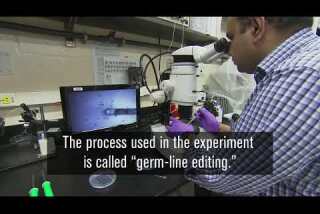
In a first, scientists rid human embryos of a potentially fatal gene mutation by editing their DNA

10 interesting facts about Mars

Kids can add years to your life

LA 90: SpaceX launches recycled rocket

Ocean temperatures warming at rapid rate, study finds
bradley.fikes@sduniontribune.com
(619) 293-1020
Get U-T Business in your inbox on Mondays
Get ready for your week with the week’s top business stories from San Diego and California, in your inbox Monday mornings.
You may occasionally receive promotional content from the San Diego Union-Tribune.



